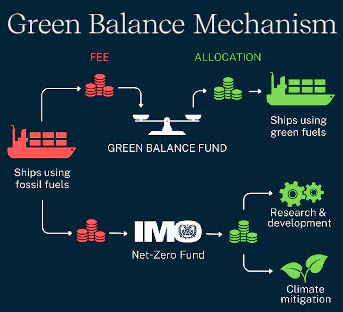
Today the World Shipping Council (WSC), the international association representing the world's leading shipping companies operating in the containerized maritime transport segment, presented the further developments of Green Balance Mechanism, the system designed by the WSC for maritime transport to reach the goal of zeroing in on its own greenhouse gas emissions by 2050 in a way that the association believes is efficient, fair and equitable. The new version of the mechanism was presented ahead of the seventeenth intersession meeting of the Working Group on Greenhouse Gas Emissions and the Eighty-second Session of the Marine Environment Protection Committee (MEPC), meetings scheduled by the International Maritime Organization (IMO) between September 30 and October 4 next.
Recalling that the Green Balance Mechanism has already received a positive reception among the nations represented at the IMO and among other interested parties, the WSC explained that the mechanism is fully integrated with a standard of the greenhouse gas emission intensity of naval fuels and is a system based on the application of a fossil fuel tax that will power a Green Balance Fund and the allocation of these funds from the collection of the green ship tax to make sure that the average cost of the fuel used for shipping is almost equal.
The Green Balance Mechanism provides that the amount arising from taxation and the amount of funds to be allocated are calculated each year on the basis of the amount of green fuels used and market prices, so as to balance the cost of very different fuels. The mechanism predicts that the greater the reduction of greenhouse gas emissions that a fuel ensures, on the basis of the entire well-to-wake cycle,  greater is the allocation of funds. This will accelerate the adoption of green ship fuel as well as the reduction of greenhouse gas emissions, the WSC said. In addition, the mechanism provides that all fuels that provide emission reductions above the standards set in the Green Balance Mechanism receive emission allocations proportionally to their reduction of gas emissions greenhouse. The WSC specified that the reduction in emissions required for a fuel to receive an allocation would be based on the commitments set by the IMO for decarbonisation, thus starting from a 65% reduction in respect to fuels fossils to then come to zero in 2050.
greater is the allocation of funds. This will accelerate the adoption of green ship fuel as well as the reduction of greenhouse gas emissions, the WSC said. In addition, the mechanism provides that all fuels that provide emission reductions above the standards set in the Green Balance Mechanism receive emission allocations proportionally to their reduction of gas emissions greenhouse. The WSC specified that the reduction in emissions required for a fuel to receive an allocation would be based on the commitments set by the IMO for decarbonisation, thus starting from a 65% reduction in respect to fuels fossils to then come to zero in 2050.
In addition, the Green Balance Mechanism provides for the creation of a parallel fund, the IMO Net-Zero Fund, which is always fueled by the fossil fuel tax, whose resources would be earmarked for research, development and demonstration projects and initiatives. for the mitigation of climate change.
Highlighting the urgency that the IMO will adopt specific regulations by next year in order to meet the goals for 2050, the President and CEO of the World Shipping Council, Joe Kramek, stressed that " Member States of the IMO have a unique opportunity to decarbonize the world's maritime supply chains. We don't have time for half measures, " he said. IMO regulations must allow green fuels to compete with fossil fuels in order to drive the transition effectively. If this is not the case, the risk is to increase transportation costs without achieving the progress in the climate that the world needs. " 